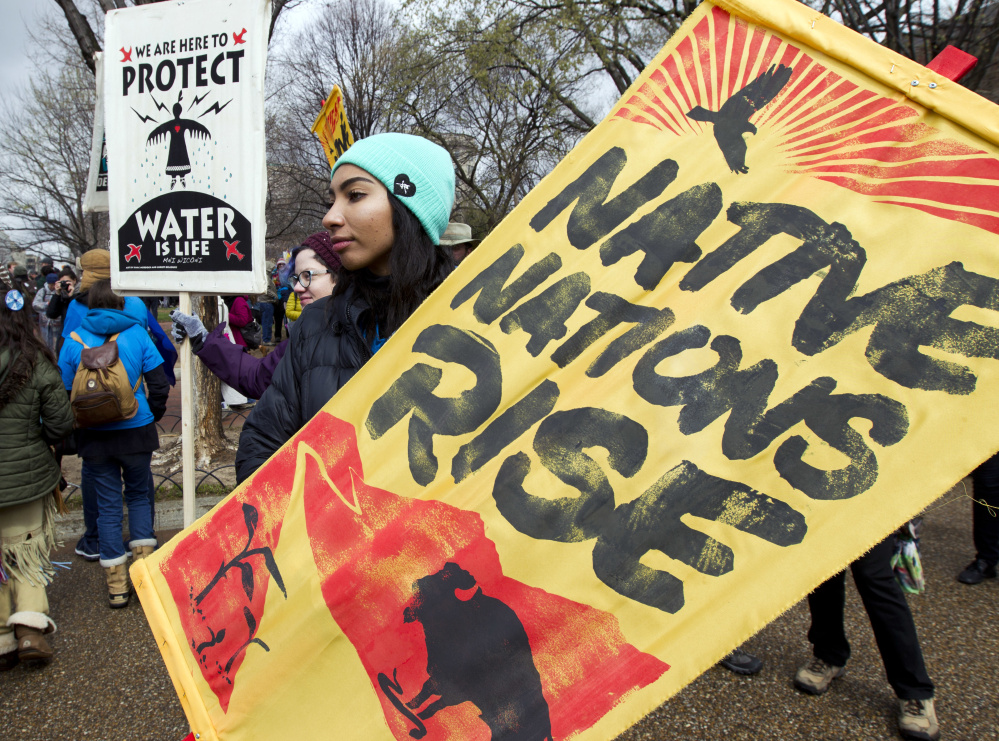WASHINGTON — The FBI counterterrorism division’s identification of a movement it calls “black identity extremists” is the latest addition to the list of protesters and dissidents the agency puts under the “domestic terrorism” umbrella.
But many national security experts say the designation doesn’t describe a movement at all, let alone a terrorism threat. It’s simply a label that allows the FBI to conduct additional surveillance on “basically anyone who’s black and politically active,” said Michael German, who left the FBI in 2004 and did undercover domestic terrorism work.
Critics are concerned that increasingly, it appears to be minorities and environmental protesters who are being targeted.
While the practice of labeling certain protest groups as domestic terrorists is not unique to President Trump’s administration, Hina Shamsi, national security project director at the American Civil Liberties Union, said there’s concern that “abusive and unjustified investigations” by the FBI are rising.
“We are worried that protesters are increasingly being labeled as terrorism threats,” Shamsi said.
The problem, Shamsi said, is partly in the overly broad definition of domestic terrorism in the Patriot Act as a violation of the criminal laws of a state or the United States that is “dangerous to human life” and appears to be intended to “influence the policy of a government by intimidation or coercion.”
Eighty-four members of Congress cited that intention to intimidate or coerce in a letter to the Justice Department last week that asked whether the department had labeled Dakota Access Pipeline protesters domestic terrorists.
Protests of the pipeline’s construction led to the arrest of 761 people, most of them on misdemeanor charges, according to the Morton County, N.D., Sheriff’s Department. Some of the protesters accused of setting fire to campsites and turning off safety valves in efforts to shut down the pipeline were charged with more serious crimes.
“Damaging pipeline infrastructure poses multiple risks to humans and the environment. When an individual burns a hole through a pipeline currently in operation, there is a high probability this could ignite the contents, killing not only the perpetrator but other innocent victims,” said the letter, written by Rep. Ken Buck, R-Colo.
Domestic terrorism is not a criminal charge, but if the label is applied to certain protesters it makes it easier for law enforcement to conduct surveillance of those groups. That surveillance can extend to seizure of assets of both individuals and an involved organization without a prior hearing and many times without evidence, Shamsi said.
The FBI report that focused on black identity extremists, leaked to Foreign Policy in October, had interest groups questioning whether the designation has been used to target members of Black Lives Matter, though it never specifically mentions the group.
The Homeland Security Department has also likened certain protests over relations with law enforcement to domestic terrorism. In a February report leaked to the Intercept, the department said that “anger over the results of the 2016 presidential election continues to be a driver of domestic terrorist violence throughout the United States – as evidenced by rioting in Portland, Oregon, following the election and destruction of property in Washington during the inauguration.”
The Portland “rioting” mentioned was an anti-Trump protest with a focus on racism in the justice system. It started as a peaceful march of about 4,000 people, but “anarchists” in the crowd reportedly started throwing objects at officers and vandalizing businesses and cars. Police declared it a riot due to “extensive criminal and dangerous behavior.”
Those riots were then cited as evidence by Homeland Security of “domestic terrorist violence.”
The ACLU has recommended limiting the definition of domestic terrorism to include only acts that “cause serious injury or death” rather than ones that are “dangerous to human life,” a more ambiguous term. But Shamsi said that’s merely a first step in correcting an overreach into citizens’ constitutional rights, one that can have a significant chilling effect on people who want to practice their right to speak out against their government.
Send questions/comments to the editors.



Success. Please wait for the page to reload. If the page does not reload within 5 seconds, please refresh the page.
Enter your email and password to access comments.
Hi, to comment on stories you must . This profile is in addition to your subscription and website login.
Already have a commenting profile? .
Invalid username/password.
Please check your email to confirm and complete your registration.
Only subscribers are eligible to post comments. Please subscribe or login first for digital access. Here’s why.
Use the form below to reset your password. When you've submitted your account email, we will send an email with a reset code.